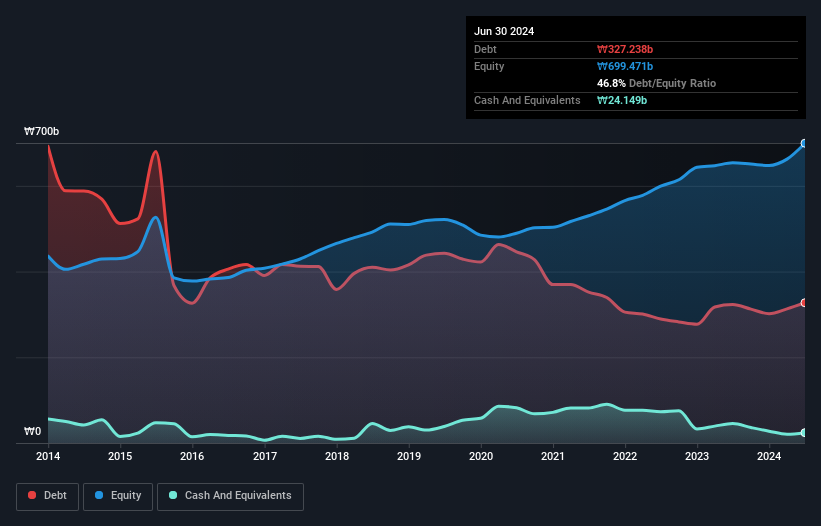- South Korea
- /
- Food
- /
- KOSE:A007160
Health Check: How Prudently Does Sajo Industries (KRX:007160) Use Debt?

Howard Marks put it nicely when he said that, rather than worrying about share price volatility, 'The possibility of permanent loss is the risk I worry about... and every practical investor I know worries about.' So it might be obvious that you need to consider debt, when you think about how risky any given stock is, because too much debt can sink a company. As with many other companies Sajo Industries Company Limited (KRX:007160) makes use of debt. But is this debt a concern to shareholders?
What Risk Does Debt Bring?
Generally speaking, debt only becomes a real problem when a company can't easily pay it off, either by raising capital or with its own cash flow. Ultimately, if the company can't fulfill its legal obligations to repay debt, shareholders could walk away with nothing. However, a more common (but still painful) scenario is that it has to raise new equity capital at a low price, thus permanently diluting shareholders. Of course, the upside of debt is that it often represents cheap capital, especially when it replaces dilution in a company with the ability to reinvest at high rates of return. The first step when considering a company's debt levels is to consider its cash and debt together.
View our latest analysis for Sajo Industries
What Is Sajo Industries's Debt?
The chart below, which you can click on for greater detail, shows that Sajo Industries had ₩327.2b in debt in June 2024; about the same as the year before. However, it also had ₩24.1b in cash, and so its net debt is ₩303.1b.

How Healthy Is Sajo Industries' Balance Sheet?
According to the last reported balance sheet, Sajo Industries had liabilities of ₩501.5b due within 12 months, and liabilities of ₩68.0b due beyond 12 months. On the other hand, it had cash of ₩24.1b and ₩84.1b worth of receivables due within a year. So it has liabilities totalling ₩461.1b more than its cash and near-term receivables, combined.
When you consider that this deficiency exceeds the company's ₩363.5b market capitalization, you might well be inclined to review the balance sheet intently. Hypothetically, extremely heavy dilution would be required if the company were forced to pay down its liabilities by raising capital at the current share price. The balance sheet is clearly the area to focus on when you are analysing debt. But it is Sajo Industries's earnings that will influence how the balance sheet holds up in the future. So if you're keen to discover more about its earnings, it might be worth checking out this graph of its long term earnings trend.
Over 12 months, Sajo Industries made a loss at the EBIT level, and saw its revenue drop to ₩633b, which is a fall of 2.6%. That's not what we would hope to see.
Caveat Emptor
Over the last twelve months Sajo Industries produced an earnings before interest and tax (EBIT) loss. To be specific the EBIT loss came in at ₩11b. When we look at that alongside the significant liabilities, we're not particularly confident about the company. It would need to improve its operations quickly for us to be interested in it. Not least because it had negative free cash flow of ₩16b over the last twelve months. That means it's on the risky side of things. There's no doubt that we learn most about debt from the balance sheet. But ultimately, every company can contain risks that exist outside of the balance sheet. These risks can be hard to spot. Every company has them, and we've spotted 4 warning signs for Sajo Industries (of which 1 is concerning!) you should know about.
When all is said and done, sometimes its easier to focus on companies that don't even need debt. Readers can access a list of growth stocks with zero net debt 100% free, right now.
New: Manage All Your Stock Portfolios in One Place
We've created the ultimate portfolio companion for stock investors, and it's free.
• Connect an unlimited number of Portfolios and see your total in one currency
• Be alerted to new Warning Signs or Risks via email or mobile
• Track the Fair Value of your stocks
Have feedback on this article? Concerned about the content? Get in touch with us directly. Alternatively, email editorial-team (at) simplywallst.com.
This article by Simply Wall St is general in nature. We provide commentary based on historical data and analyst forecasts only using an unbiased methodology and our articles are not intended to be financial advice. It does not constitute a recommendation to buy or sell any stock, and does not take account of your objectives, or your financial situation. We aim to bring you long-term focused analysis driven by fundamental data. Note that our analysis may not factor in the latest price-sensitive company announcements or qualitative material. Simply Wall St has no position in any stocks mentioned.
About KOSE:A007160
Sajo Industries
Primarily operates as a food company in South Korea and internationally.
Low and slightly overvalued.
Market Insights
Community Narratives


